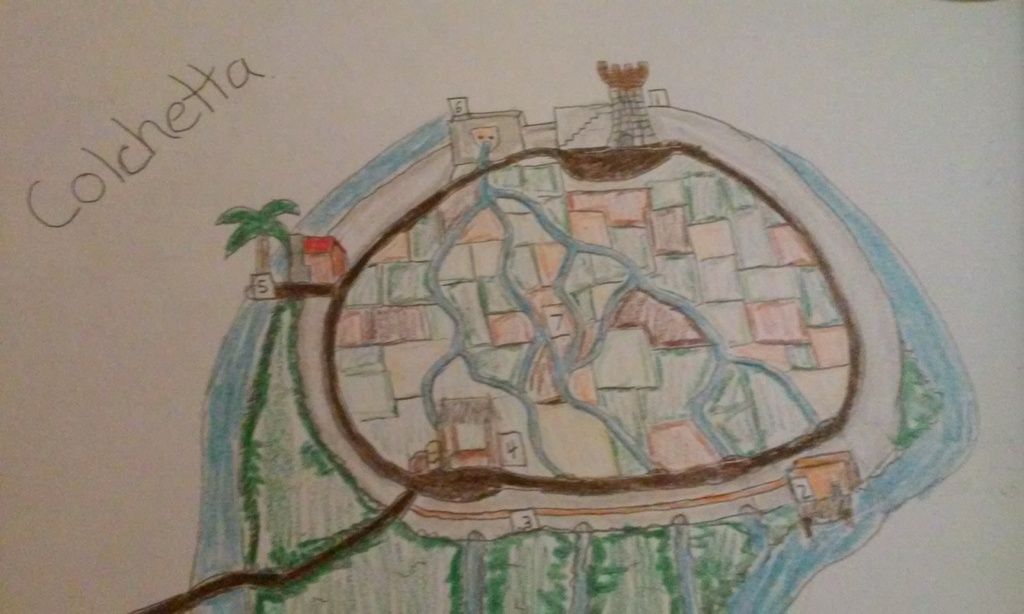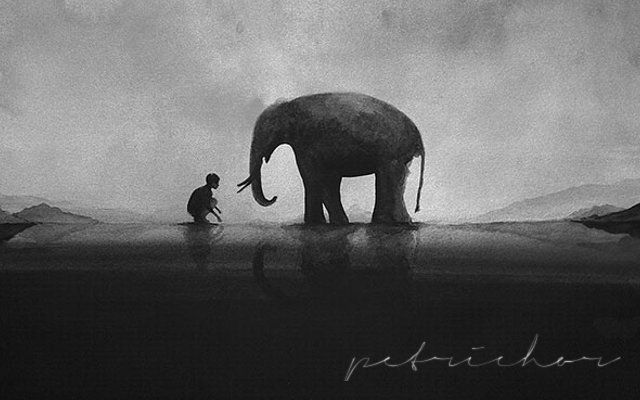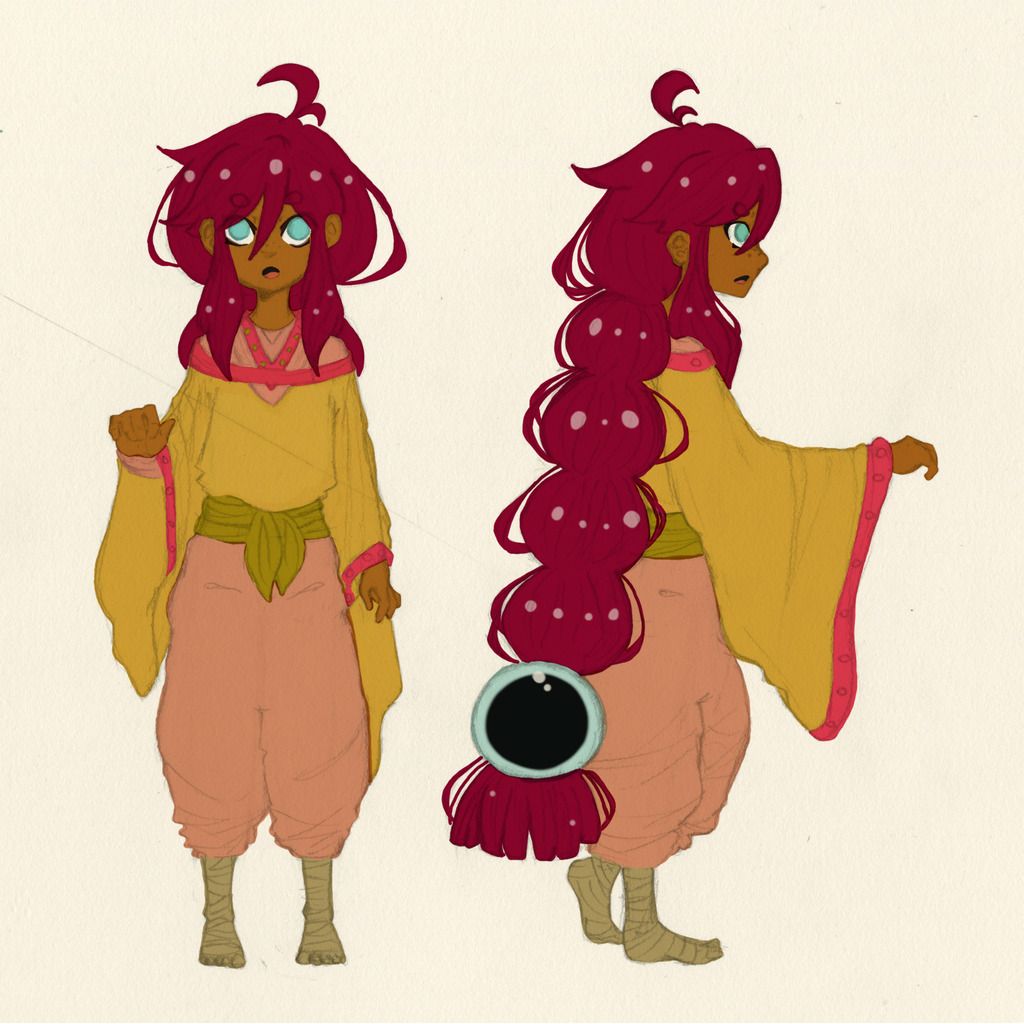Once a bustling peninsula of trade for the kingdom of Airedale, the few remaining villages are but ruins of former glory. Flooding, disease, and the rise of reptilian creatures with interests staked on land once owned by humans has left a single stronghold, a coalition of villages who have since risen above the horrors of an ending era. This is the land they call Colchetta.Infrastructure: The whole outer portion of Colchetta is defended by a wall of stone. This required over a hundred years to build in its entirety, but was made possible due to a nearby quarry of greystone. Marking each turret of the wall (each turret spans about one mile apart) is a great brazier set to be lit at any time—this is the system of defense to warn of attack. The southernmost area of the wall is further fortified by a dam, which regulates the flow of water to farmland within the walls. Also of note are the flood canals dug around the walls, which are used to divert the flow of the great river Oros away from Colchetta.
Most buildings are constructed of wood and sun-baked mud from river Oros, with temples and fortresses instead being constructed of grey stone. This results in an overall warm appearance of the towns.

1.
Leiland, the fortress-town. It contains the only buildings maintained since the disaster of 300 years ago, among which is Castle Leiland. Its ancient barracks, ranges, and stables still train soldiers today, and it is mostly known for being the capital of military power for this reason. The ruling monarch of Colchetta also resides in Leiland with his council, and it is said that the fortresses built since Leiland’s re-founding store heaps of supplies and wealth in the case of another disaster.
2.
Port Andrea , the roots of trade. Though the last fully reconstructed area of Colchetta, it was a strategic point of the archipelago where supplies and stone from quarries could be ferried. Its waters connect to the wide river Oros, which spans only a few more miles before connecting to the sea. Because of this position, it enjoys a position of trade, fishing, and even mining, as operations are held just beyond the other side of the river.
3. War Wall, Colchetta’s first defense. A stone wall standing just over fifteen feet tall, it has managed to repel the beasts and enemies that once came skulking over Colchetta’s borders. Wall towers peer even higher, dotting the wall with each tower one mile apart.
4.
Trenna, center of trade. Once a farming village, it became so much more when refugees and mercenaries came flooding to Colchetta. It houses the wealthiest merchants and guilds of Colchetta and brags the most diversity, as goods and people from across the land come wandering into the town to resupply and rest.
5.
Keithon, center of knowledge. Because the knowledge of the past in addition to knowledge gained is so important to the people of Colchetta, the entirety of Keithon is based around libraries and academies. It features the most creative architecture of Colchetta and houses plants and animals unsuited to the natural terrain of the area.
6.
Bridle of Oros, the key of prosperity. An ancient dam built and maintained for hundreds of years, the Bridle of Oros is the city’s most important feature. It averts floods, provides needed canals for farms, powers watermills, and even carries sewage out of the city.
7.
Eye of Oros, the lifeblood of Colchetta. These farmlands provide excessive amounts of food to feed the surrounding towns. An endless series of steadings house the farmers who work the land and provide an endless stream of food to those living or visiting Colchetta.
History: When Airedale was first destroyed by the calamity of 300 years ago, Leiland was the sole remaining fortress for civilians to flee. War had devastated other areas of Airedale while natural disaster and crazed animals managed to destroy what villages managed to be spared from conflict. This left Leiland full of refugees, but only for a time. Torrents of rain, an increase in temperature, and flooding led to mass deaths, placing the people of Airedale on the fringe of extinction.
In such a time of crisis, it was the laborers among panicked soldiers and nobility that became their people’s salvation. They built a dam over the once tame river Oros, effectively draining formerly occupied lands. There was nothing to scavenge, but the soil was rich and the climate perfect for crops. They began retaking the area that would be known as Colchetta, fighting off wild beasts and beginning construction of a wall that would promise peace for generations to come.
Their success was such that other survivors around the nation flocked to them. Villages Brenna and Keithon came into being, soon followed by Port Andrea. Over centuries, these areas would become sprawling towns around a great circle of fertile farmland.
Climate: Tropical
Exports: Grain, livestock, ironworks, spices, cotton
Imports: Ores, precious metals, stone, mercenaries
Government: The top of society consists of the king, his chosen councilmen, and the nobles beneath them. When the king dies or retires, the eldest of the council ascends the throne while the council elects a new councilman to fill the empty seat of the former councilman. This ‘election’ is a process open to all citizens of Colchetta, with the restriction that each tentative participant be native-born. Participants undergo a series of tests and campaign for the favor of the people, with the most successful person standing before the council in a final assessment. Should he or she pass, he or she ascends to the position of councilman.
Titles of nobility are placed upon families with one or more members who have given exemplary contribution to society. Archeologic finds are the most prestigious reasons to be raised to nobility, though they are equally rare. Families who spend generations protecting the walls, expanding trade territory, or making significant discoveries of science are also given titles. Those who receive titles become exempt from property tax and are able to petition the king and his councilmen in person for matters regarding law and practice. Many also receive pensions or other monetary rewards for their service.
Cuisine: Expansive fields provide a steady crop and source of livestock. Poultry and pork are among the most common meats, superseded only by the endless supply of river fish Oros provides. Rice is the most common staple of grain, with smaller amounts of wheat making bread and pastas available. Fruit is relatively plentiful by virtue of drained orchards, providing oranges, lemons, pineapple, guava, magoesand pomegranates. Melons are more popular. Finally, vegetables of beans, beets, okra, bamboo, peppers, squash, and eggplant are the most prominent in their cuisine.
Culture: Colians fancy themselves among the most advanced of surviving societies, making use of architecture and creative weaponry as well as trading techniques to keep their place in the world secure. Within the walls of Colchetta, life is peaceful, yet immediately surrounding them is constant danger. Thus, while some Colians are happy to cower behind the security of Colchetta, many brave men and women are required to maintain walls, the Bridle of Oros, and to fight off would-be raiders both human and monstrous alike. Bravery and brilliance are the most cherished virtues of personality, as they lead to innovation, security, and the hard work necessary to survive.
Colians revere the past ages, believing that prosperity ruled before chaos did. For this reason, they seek out all things ancient that remain in the world, hoping to uncover more knowledge. They take pride in their roots of Airedale and encourage other tribes to uncover their past, even offering Colian expedition teams to aid in such efforts.
Social Strata:Monarchy- Because of their proven intelligence and ability, the monarchy and its surrounding members are highly respected people of Colchetta. They have passed through a veritable crucible and lead by example, sometimes even referred to like saints.
The Church of Casper- The head priest of the church is said to be the most educated of Colchetta’s people, a veritable keeper of all knowledge they have collected. Those who call themselves priests of Casper have dedicated their lives to following His edicts (as well as accepting all tasks placed upon them by the head priest) and are often orphans, widows, or other members of society who have no means to provide for themselves. Because of the hardships they have faced and their iron will to continue helping Colchetta’s people, they are deemed respectable despite their poor circumstances. They also learn after the Head Priest, gaining formal understanding of language, architecture, and the Old Ways.
Artisans and Engineers- Those gifted with arts and sciences are crucial to the furthering of Colian culture. In the absence of so much of their former civilization, they strive to create music, writing, buildings, and even weaponry that will continue to their unique and powerful identity.
Merchants-Few are they who can comfortably remain within Colchetta’s walls playing middleman for the small circle of towns who sustain themselves. Those who wish to truly be successful have no choice but to take their ventures beyond Colchetta’s wall, and their ventures to do so are known as “Oros’ Gambit.” The process begins with hiring on an expedition guild, a group of professionals who prospect the wilds for potential resources, discover or create new routes of trade or travel, deliver business propositions to other tribes, and whatever other preliminaries a business requires.
Though it may sound simple, the venture is called a gambit for a reason. Expedition guilds are not cheap and even the best are prone to failure. The world beyond Colchetta is unpredictable and harsh, leaving even the most prepared professionals vulnerable to all manner of violence, disease, and disaster. An investment gone awry spells disaster for a newly expanding business, leaving most budding merchants no choice but to return to being laborers.
The few who are successful, however, achieve no small service to their people. They open up new venues of trade and prosperity, which in turn strengthens and diversifies the economy.
Soldiers and Mercenaries-Those who dedicate their lives to the protection of Colchetta, its caravans, and its expeditions are considered to be respectable. It requires great courage to step beyond the walls, but such is necessary to fend off attackers and upkeep defenses.
Laborers- The vast majority of the population consists of laborers, men and women who manage fields, canals, buildings, roads, and whatever other physical needs Colchetta has. They may still be called out beyond the walls to accompany expeditions or gather resources, but experience the smallest pay available. Unfortunately, there isn’t much justice as far as employment terms, as laborers are considered more expendable than any other member of society.
Military: The military of Colchetta consists of three separate branches: Domestic Militia, Wall Guards, and Special Forces. The domestic militia (approximately 70 strong) consists of local sheriffs who deal with local crime, tax collection, and even basic upkeep of military strongholds. The Wall Guards (approximately 250 strong) are responsible for keeping watch as well as doing battle with enemies who attempt to breach the city’s borders. Due to their non-stop struggles with swamp-folk, many of the waterways leading out of Colchetta must be kept on constant vigil.
Their current weaponry consists of shortswords, heavy javelins (known as pliums), pikes, crossbows, and kite shields. Most soldiers wear chainmail with a single breastplate and greaves, with higher-ups and cavalry donning full plate mail. Groups forced to fight well beyond the wall are forced to wear lighter leather armor to allow better movement, but such soldiers are also armed with nets and other devices used to trap wild beasts. They have also built magonels and trebuchets to help defend the outer areas of Colchetta.
Religion: Casper is Colchetta’s god of creation and its strongest tie to ages past. His likeness has been carved into many temples across Airedale (most of them now lost to flooding and the intrusive jungle terrain), and a significant portion of His ancient scriptures preserved. It is due to these scriptures that Colchetta was able to preserve the now ancient language of Cantran, both in spoken and written form.
Recorded prayers to Casper for creative inspiration, protection, and guidance are sacred to Colians. Most recite at least one of them daily, or personally pray to Casper in their own words. The general belief is that mankind experienced an age of prosperity and that it was demonic beings known as Ruse who brought chaos and ruin. More recent beliefs have even claimed the Ruse to be natural enemies of Casper and mankind itself and that their re-appearance would herald the end of the world.
The Law of Casper:-The world was created that man might learn to shape it. Use your talents and resources to bring order and beauty to it, thus improving upon the raw material Casper has provided.
-Steadiness is a virtue. Be patient in the face of need and pain, yet not slothful to take ahold of presented opportunity. Strength is the little stream that carves into the mountains day after day—the torrents of the sea bring only ruin.
-There is not only one kind of intelligence. Every human being has the potential to become a scholar in his or her own field.
-Surviving alone or merely loafing along gives no meaning to existence. Strive to expand your horizons through thought and creativity.
Colian Perks: Coinage-Colchetta was the first tribe to continue the use of coinage as currency. For this reason, the Colian
citlus (the equvalient of an American dollar, since that’s the simplest for me to work with) is the unit standard for a large portion of merchants.
Literacy-Even common laborers are schooled to read and write in Cantran, all for the sake of preserving the language no matter what circumstances befall Colchetta.
Expeditionary Folk-Because of the large volume of guilds in Colchetta, many Colians can be found throughout the world, usually under service of Colian merchants or its councilmen to perform tasks of trade and exploration. Caravans guarded by trained Colian mercenaries are also fairly common.
Colian Weaponry-Ingenuity and security provides unique Colian weaponry. See the “Military” section for weaponry available to Colians and those affiliated with them.
Colian Drawbacks:Madness of the Ruse-To date, no cure for the madness has been found. While Colians aren’t especially susceptible to it, those found with its symptoms are executed, as it is considered both a “mark of the Ruse” and a threat to society. This particular belief also makes staunch enemies out of those who revere or wish to give tribute to the Ruse.
Flooding-Though Colchetta’s success depends almost completely upon flood control, the jungle immediately around it is beyond its control. There is only one safe road leading from Colchetta to the plains beyond the jungle of the peninsula, a feat achieved by grey stone roads and bridges that remain above the typical flood plain. Travelers or expeditions wandering away from the safety of the road are prone to being swept up in flash floods, which limits Colchetta’s ability to harvest outside resources.
Jungle Beasts-The jungle surrounding Colchetta is exceptionally dangerous. Insects bearing disease, semi-intelligent amphibians with poison, and predatory mammals all inhabit the forest. The former capital of Airedale is said to be so overrun that every attempted expedition to the area has never returned.
Anti-Magic-Colians harbor the belief that magic is an aspect belonging soley to gods, and that in the hands of mortals (and certainly creatures like the Ruse), nothing but chaos is bound to occur. Thus, they have no studies of magic, no magical defenses, and are even prone to levy blame on magic-bearing tribes for the current state of the world.
Trade-Although Colchetta has become relatively stable, it owes a large part of its prosperity and innovation to the trade its expeditions have achieved. They rely more and more on outside caravans and mercenaries to expand and protect their horizons, as every effort to recover the former peninsula of Airedale requires an incredible amount of effort and resources.
Gossip:“Peace? This ain’t peace. Step outside the walls, blink, and you’re a goner.”
Percy Meland, prospector of the Elqousian Expedition Team.
“We stand upon a foundation of stone, yet the world around us is as sand. If we lose our footing for even a moment, countless Colians suffer.”
Lady Ellen Carsican, co-owner of The Colian Trading Company.




